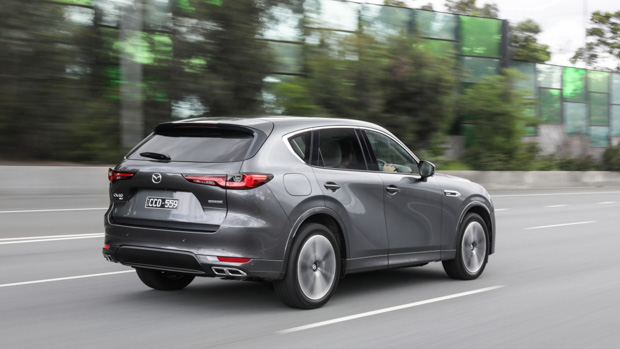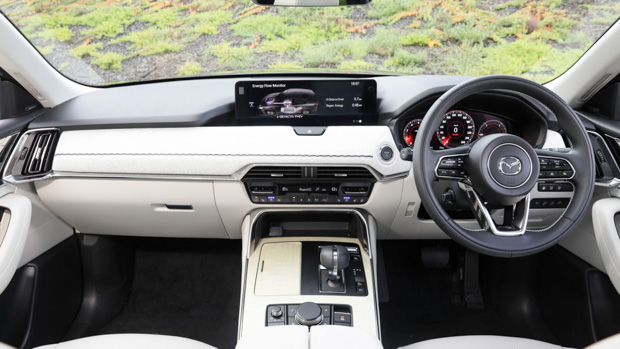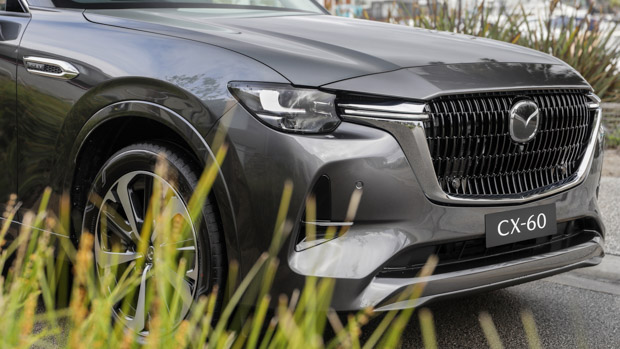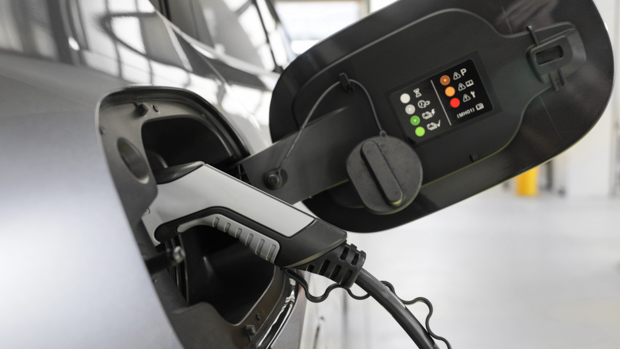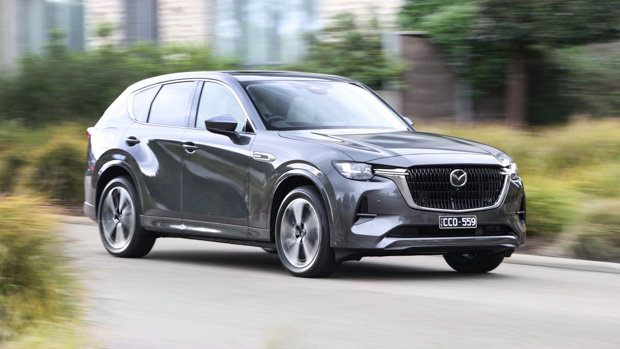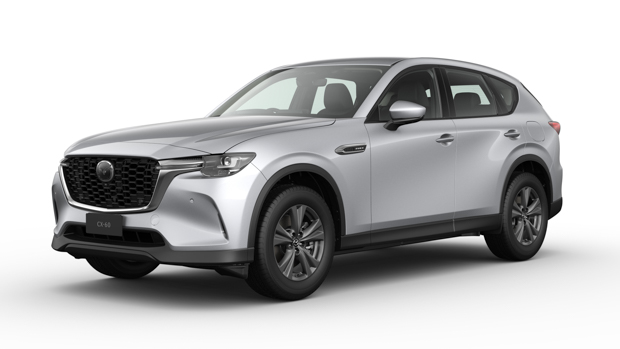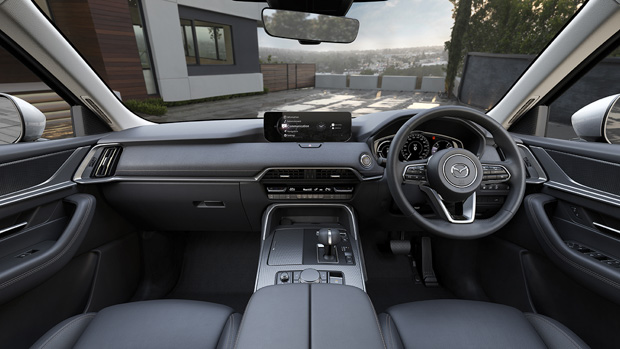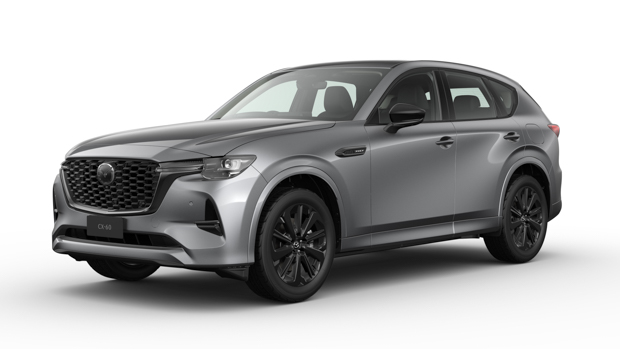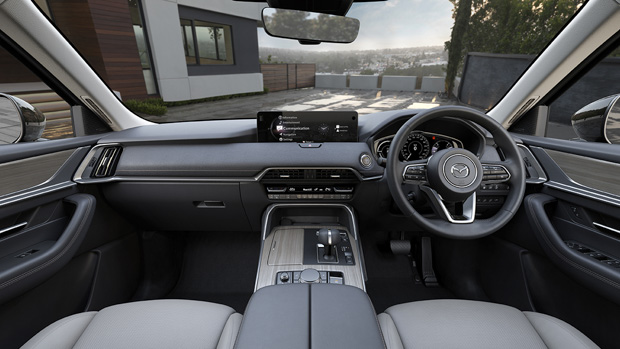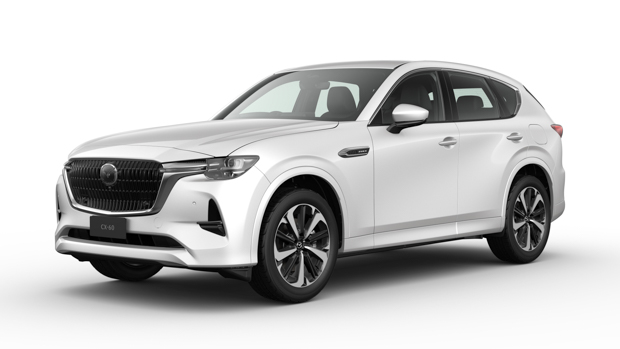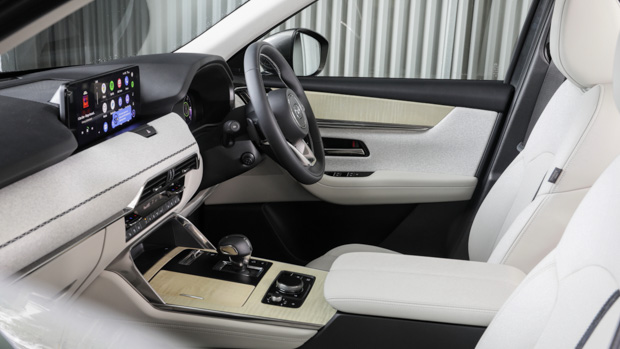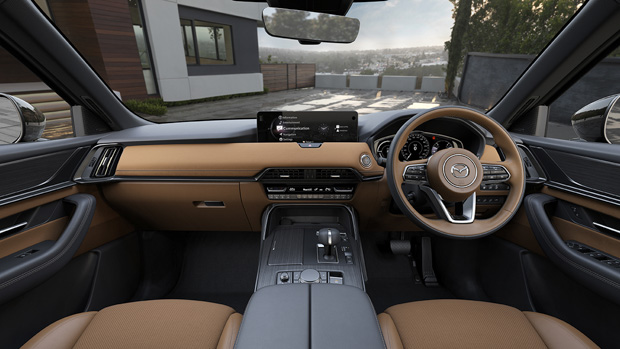-
Car Reviews
- Car News
-
Car Comparisons
Latest comparisons
- Chasing Deals
Extensive CX-60 range dramatically undercuts BMW, Volvo and Lexus rivals with big petrol and diesel sixes, plus a frugal PHEV option
Mazda’s push into luxury product territory begins with the new CX-60 midsize SUV – a BMW X3 and Audi Q5 rival that will be released in Australia in June 2023, while orders commence today.
The luxuriously-appointed, six-cylinder CX-60 is intended to stop what Mazda sees as an outflow of CX-5 owners to premium SUVs when they want a little more plushness.
To that end, the CX-60 retains some familiar cues from the 17cm-shorter CX-5 – long a darling of the Australian SUV market – but the new model sits on a brand-new, rear-wheel drive architecture with much larger and more powerful engines that have been validated in Australia.
Pricing is sharp compared to the Audi Q5 (from $67K), BMW X3 (from $77K), Lexus NX (from $61K) and Volvo XC60 (from $73K). By contrast, the Mazda CX-60 will be priced from $59,800 before on-road costs in Australia.
Three model grades will be offered for the CX-60 in Australia. There is no traditional base model, with the effectively mid-specification Evolve standing in as the entry-level variant.
A sportier and more luxurious GT grade (from $67,800) is expected to be the volume-selling version of the CX-60, while the flagship Azami brings an even more plush interior fitout, priced from $73,000 – the level where most rival cars kick off.
Full pricing can be found at the bottom of this article.
Not only is the CX-60 more affordable than its German, Japanese and Swedish luxury rivals: it’s also far better-endowed in the engine department as standard than those vehicles.
That’s because the CX-60’s entry-level engine is a turbocharged and inline six-cylinder 3.3-litre petrol producing 209kW of power and 450Nm of torque. This 48-volt, mild-hybrid engine will be badged as the CX-60 G40e.
The G40e Evolve’s sub-$60,000 list price will see the Mazda take a big, 3.3-litre swing at rivals like the Lexus NX250, which uses a non-turbo four-cylinder petrol engine, and the Audi Q5 35 TDI, which at $66,900 (list) remains a front-wheel drive diesel with 120kW of power.
$3000 dearer than the six-cylinder petrol is a diesel version of the same fundamental engine. The oil-burning variant of Mazda’s new 3.3-litre straight-six makes 187kW of power and a stout 550Nm of torque, again with a 48-volt mild hybrid system. The diesel will be badged D50e.
The sole four-cylinder engine in the CX-60’s Australian line-up is a plug-in hybrid that we’ve already reviewed.
The P50e PHEV powertrain pairs a 141kW 2.5-litre naturally-aspirated petrol four with a 100kW/250Nm electric motor for combined outputs of 241kW/500Nm, making the CX-60 PHEV the most powerful production Mazda vehicle ever.
Attracting a $12,500 premium over the six-cylinder petrol, the CX-60 PHEV is expected to account for the smallest share of volume, but its circa-60km (WLTP) electric driving range will suit many Australian families.
Unlike most SUV rivals, the CX-60’s plug-in hybrid powertrain is available across all grades rather than simply the flagship model – making the $72,300 P50e Evolve PHEV look rather affordable against the Lexus NX450h+ F Sport’s $89,900 price tag.
All CX-60 engines are matched to an eight-speed automatic transmission that uses a clutch pack instead of a traditional torque converter. All are AWD with a substantial rear bias.
Unusually, while the six-cylinder petrol and PHEV engines will be rated to tow 2500kg in Australia, the large-capacity diesel will be limited to 2000kg.
Mazda Australia succeeded in eliminating a non-turbocharged four-cylinder petrol from the CX-60’s expected launch lineup, while a decision was also made to add turbocharging to the six-cylinder engine that will be naturally aspirated in Europe.
Unusually, all three CX-60 engines will be available with all three trim grades of the luxury SUV, with the 3.3-litre petrol, 3.3-litre diesel and 2.5-litre PHEV powertrains all offered in Evolve, GT, and Azami form.
Evolve models offer a fairly cost-effective entry point to the CX-60’s six-cylinder, rear-biased AWD motoring. This entry grade is priced at $59,800 (petrol six), $61,800 (diesel six), or $72,300 (PHEV). You’ll pick it from its chunkier tyres, 18-inch wheels and additional wheel arch plastic cladding.
Standard features on the Evolve include LED headlights, a leather steering wheel and shifter, heads-up display, wireless Apple CarPlay and Android Auto, and an eight-speaker stereo.
On the safety front, the grade scores forwards and reversing AEB, blind spot monitoring, adaptive cruise control, lane centring, and a 360-degree camera.
Where the Evolve skimps on the luxury experience is its use of manually-adjustable, vinyl-trimmed Maztex seats without a cooling function – plus its steering wheel is also manually adjustable. At 10.25” and 7” respectively,, its central screen and driver display are smaller than the rest.
The Evolve grade can be optioned with a $2000 vision technology package that adds additional safety tech in the form of low-speed autonomy in the form of cruising and traffic support, a see-through view for the 360-degree camera, front cross traffic alert, driver attention monitoring, and a bigger 12.3-inch central touchscreen.
Further, the Evolve grade can be ticked with a $4000 luxury pack that switches out the Maztex upholstery for black leather with front seat heating and power adjustment, along with driver’s seat and mirror memory functions.
Luxury appointments step up with the GT grade, which for a $8000 upcharge adds full leather upholstery, front and rear seat heating, power front seat and steering wheel adjustment, a panoramic sunroof, Bose audio, and 20-inch wheels to the fore.
The GT also takes a tech leap, adding the full-fat 12.3-inch central infotainment screen and digital driver displays to the standard equipment list – plus higher-tech exterior lighting with ‘signature’ rear light illumination and a dark signature for the LED headlights.
It is dressed in darker tones outside with gloss black mirrors, a black grille, and black-coloured 20-inch alloys – plus the wheel cladding becomes body coloured rather than unpainted plastic, as in the Evolve.
Like Evolve, a $2000 vision technology package is available as an option on GT. On this grade, the pack additionally adds adaptive LED headlights.
The flagship CX-60 Azami is a reasonable $13,200 jump over a base-grade car but adds a high degree of plushness. The GT’s standard leather becomes nappa-quality hide, while the front seats gain a cooling function and the door trims are finished in leather as well.
Adaptive LED headlights are standard on the Azami, along with LED ambient lighting, a see-through function for the 360-degree camera, low-speed autonomy with cruising and traffic support (which adds stronger lane centring for the adaptive cruise control), and a driver personalisation system that finds an ideal seating position based on height inputs.
Outside, the CX-60 Azami wears additional brightwork in the form of machined silver/black alloy wheels, plus extra chrome at the front end.
Two option packs for the Azami allow buyers to choose different visual directions for the car.
The $2000 Takumi package makes the car present as the hero CX-60 specification does overseas, with white nappa leather upholstery, white maple wood trim, and intricately stitched cloth trim on the dashboard and doors.
Alternatively, a $2000 SP package turns down the brightness, switching out exterior chrome for gloss black finishes. Inside, the SP brings tan nappa leather upholstery, along with a suede dashboard panel.
All prices listed are before on-road costs.
Latest news
About Chasing cars
Chasing Cars reviews are 100% independent.
Because we are powered by Budget Direct Insurance, we don’t receive advertising or sales revenue from car manufacturers.
We’re truly independent – giving you Australia’s best car reviews.
